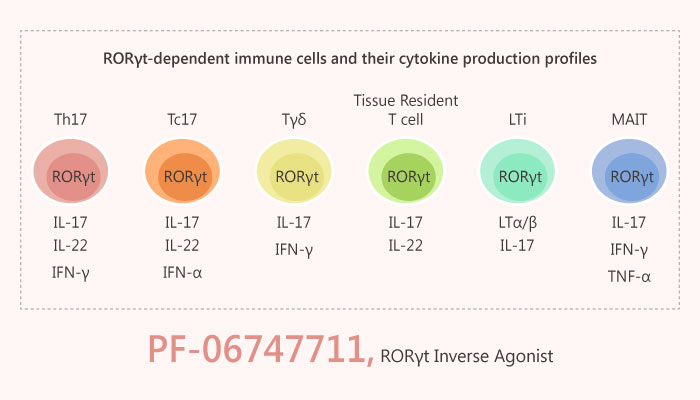Autoimmune diseases are due to an abnormal immune response to a normal body part. They have many types, such as rejection of organ transplantation, allergy. The nuclear hormone receptor RORC2 plays an important role in autoimmune diseases. Its full name is retinoic acid receptor-related orphan C2, also known as RORγt. Nowadays, small molecules targeting RORC2 are popular in research. PF-06747711, a potent RORC2 inverse agonist, has great bioactivity in skin inflammation.
Mark E. Schnute et al underwent a couple of steps to synthesize a lot of analogues. Some are similar to 1-Methylindole in structure.

In the first place, they screened 15000 products. The concentration is 5 μM. As a result, compound 66 (PF-06747711) exhibits promising activity. It has an IC50 of 4.1 nM for RORC2. PF-06747711 also inhibits IL-17A production in human Th17 cells, with an IC50 of 9.5 nM. Moreover, the compound suppresses mRNA production of IL17A, IL-17F, IL-22, IL-26, and IL-23R. However, PF-06747711 shows no inhibitory effect on RORC expression.
Then, in other cellular studies, PF-06747711 does not affect Th1 and Th2 lymphocyte differentiation or cellular viability of lymphocytes.
Subsequently, in the animal assays, PF-06747711 demonstrates high oral availability in spray-dried dispersion formulation. In anti-inflammatory mice model, PF-06747711 is dosed orally, and daily over 5 days. The doses are 10, 30, and 100 mg/kg, respectively. PF-06747711 blocks ear swelling in a dose-dependent manner in mice. At the highest concentration, the maximum inhibition is 46%.
Lastly, PF-06747711 is a potent, selective, and orally active RORC2 inverse agonist. It has great pharmacokinetic properties in animal models. Thus, RORC2 modulation of small molecules is a promising target for inflammatory disease research.
References:
Schnute ME, et al. J Med Chem. 2018 Dec 13;61(23):10415-10439.